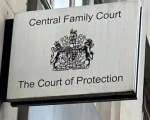What does the Court of Protection do?

The Court of Protection makes decisions on financial or welfare matters for people who can’t make decisions at the time they need to be made (they ‘lack mental capacity’) UNLESS they have taken the sensible precaution of appointing family or friends to make such decisions through making Lasting Powers of Attorney.
I am told that costs for a professional Deputy appointed by the Court could exceed £5,000 a year. That puts the cost of LPAs in the shade!
The judges of the Court of Protection are responsible for:
- deciding whether someone has the mental capacity to make a particular decision for themselves.
- Appointing deputies* to make ongoing decisions for people who lack mental capacity.
- Permitting people to make one-off decisions on behalf of someone else who lacks mental capacity.
- Handling urgent or emergency applications where a decision must be made on behalf of someone else without delay.
- Making decisions where there are concerns about a Lasting Power of Attorney or Enduring Power of Attorney and considering any objections to their registration.
- Considering applications to make statutory Wills or gifts.
- Making decisions about when someone can be deprived of their liberty under the Mental Capacity Act. After known as “DOLS” – deprivation of liberty.
What is a Court of Protection Deputy?
A “deputy” is a person the Court of Protection appoints to make decisions for you if you have lost the capacity to make them yourself. A deputy usually makes decisions about finances and property. The court can appoint a deputy to take healthcare and personal care decisions, though this is relatively rare. Professional attorneys are paid, and the costs can be quite substantial, especially when dealing with routine matters. Lasting Powers of Attorney will pay for themselves most weeks and many times over, saving the substantial cost of even applying to get a deputy appointed, so PLAN AHEAD! All costs are taken from the assets of the “patient” who is known as “P.”
Where is the Court of Protection?
The main base is London, but there are regional offices throughout England and Wales. I have listed the most relevant ones for the majority of my clients, London and Reading, below. District judges and a senior judge hear most cases but can sometimes be heard by High Court judges. Cases can sometimes be transferred to a local court for a hearing.
Contact COP Court of Protection
PO Box 70185
First Avenue House
42-49 High Holborn
London
WC1A 9JA
co************************@ju*****.uk
CoP South East Regional Hub
160-163 Friar Street
Reading
RG1 1HE
co***********************************@ju*****.uk
0118 987 0500 DX 98010 Reading 6
Court of Protection Costs
The Court allow lawyers a fixed fee of £1,140 for making the application and obtaining the Deputyship Order. However, in reality it is more likely to be in the region of double that in many cases – and that is just the lawyers fees, Court of Protection fees are on top of that.
In addition, the following Court of Protection costs will apply:
- £400 Court application fee – this fee must be paid when submitting the COP1 application form to the Court.
- COP3 Capacity Assessment – it is likely that the medical practitioner completing the COP3 Capacity Assessment will charge a fee for doing so. The fee will be set by the medical practitioner who completes the form, and they will normally inform the deputy or their legal advisor of the proposed fee before conducting the assessment. £900 is not unknown.
- Deputy Bond Fee – the Court of Protection will determine the level of security which should be put in place. They will write to the deputy or their legal advisor with details of the Deputy Bond fee. This is payable annually,
- Deputy Assessment Fee – once appointed by the CoP, the Office of the Public Guardian will determine the level of supervision that a deputy requires. The fee for this assessment £100.
- Annual Supervision Fee – if the Office of the Public Guardian determines that a deputy requires ‘general supervision,’ the annual fee is currently £320. Where the level of supervision is set at ‘minimal’ that is reduced to £35 a year.